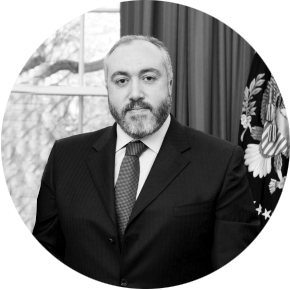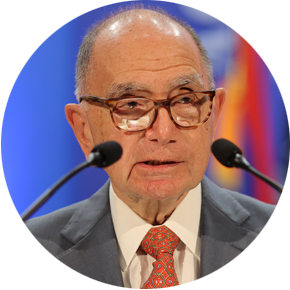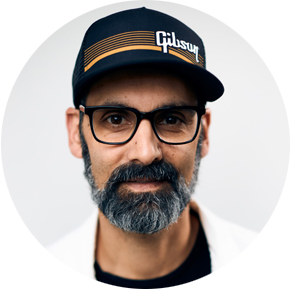Georgian President Giorgi Margvelashvili will arrive to Yerevan today with an official visit today.
On the eve of the visit Mediamax talked to Temuri Yakobashvili, Senior Transatlantic Fellow at the German Marshall Fund (GMF) of the United States. Before assuming this position in March 2013, Temuri Yakobashvili served as the Ambassador of Georgia to the United States beginning in early February 2011. Prior to that posting, he was a Deputy Prime Minister and State Minister for reintegration in the Government of Georgia.
- What is your assessment of the current state of Georgian-Armenian relations? What is going well and what can be further improved?
- Georgian-Armenian relations can be called friendly and functional, and currently there are no issues in the relationship at the bilateral level that would require specific political effort. Today there is a framework in place of functioning mechanisms to address any political or economic candor issues. Any improvement in the relationship will depend on whether larger projects for
cooperation, especially economic ones, are available.
- Do you think that Armenian-Georgian relations can improve or deteriorate after the full change of power in Georgia?
- I think, basically, that relations will remain the same. I cannot detect any appetite, on either the Georgian or Armenian side, to drastically change the current state of affairs.
- There is an impression that Mikheil Saakashvili never perceived Armenia as an independent player and was treating it as Moscow’s “agent”. How true is this?
- That impression is entirely false. The previous Georgian leadership recognized the factors and sensitivities that affect Armenia's geopolitical choice, and this never undermined their relationship. Georgian-Armenian relations have a larger history than Armenia's foreign policy priorities.
- This year Armenia will join the Customs Union and Georgia will sign the Association Agreement with EU. Some think this could create a “dividing line” between two countries. What can be done from both sides to avoid such situation?
- A dividing line should not be expected, but we may see complications in bilateral trade during the initial stage of adoption of the two documents. A certain amount of time is necessary for the new reforms required of membership in the Customs Union and Georgian obligations under the Association Agreement to be adopted. Any sort of division would most likely be visible through the increasing costs of business interaction.
- When you were part of Georgian cabinet, you were dealing with the issue of Armenian monuments in Georgia and, in particular, Armenian churches in Tbilisi. However, none of the Georgian governments was able to find real solutions to the issue. Do you see any possibility for handling this issue?
- All places of worship on Georgian territory are, by default, considered a part of the cultural heritage of our country, and the diversity of it is significant added value.

Temuri Yakobashvili.
Photo: T. Yakobashvili's archive.
In the cases of disputed churches, the government promoted solutions found within the inter-church dialogue, and in the absence of agreements the government position was to proactively treat such buildings as important cultural heritage sites. For example, in non-functioning churches, a group of Armenian restorationists were invited by the Ministry of Culture of Georgia in order to restore and preserve these structures. Lastly, the decision of the government of Georgia to grant the Armenian Apostolic Church of Georgia the status of the entity of public law was important as it made the Armenian Apostolic Church of Georgia eligible for public funding.
- Armenia is isolated from regional energy and transport projects which are implemented with participation of Georgia and Azerbaijan. Do you see any opportunity for changing the situation and involving Armenia before the NK issue is settled?
- I do not expect any drastic changes in attitudes when it comes to oil or gas pipelines, but there is definitely ample room for more cooperation when it comes to electricity, both from production and transmission points of view. A joined regional electric grid may not be an excessively utopian idea, especially as Armenia upgrades its nuclear power plant.
- Shortly after Georgian Dream’s victory at the Georgian parliamentary elections there was a talk about the prospects of resumption of the Abkhazian sector of the railway which faded away, though. Do you think that this issue is among the priorities of Georgian leadership?
- Every new leadership, in the initial days of its governance, may be tempted to revisit previously discussed ideas, and there might be an initial naivety in discussing these issues.
Opening the railway in the Abkhazian segment is far beyond any technological and commercial considerations, and would require big political compromises. The prospect of the state of relations between Georgia and Russia, especially the position of the Russian Federation, do not leave room for optimism currently or in the near future. Hence, this issue will be downgraded out of the list of priorities of the current Georgian administration.
Ara Tadevosyan talked to Temuri Yakobashvili.


























Comments
Dear visitors, You can place your opinion on the material using your Facebook account. Please, be polite and follow our simple rules: you are not allowed to make off - topic comments, place advertisements, use abusive and filthy language. The editorial staff reserves the right to moderate and delete comments in case of breach of the rules.